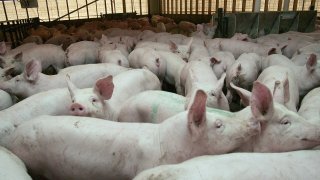
President Joe Biden's administration Tuesday rejected pleas to strengthen regulation of large livestock farms that release manure and other pollutants into waterways, promising more study instead.
The U.S. Environmental Protection Agency said it had denied two petitions from environmental and community groups seeking revision of rules dealing with the nation's biggest animal operations, which hold thousands of hogs, chickens and cattle.
“A comprehensive evaluation is essential before determining whether any regulatory revisions are necessary or appropriate,” an agency statement said.
In a letter to advocacy groups, Assistant Administrator Radhika Fox said EPA will look closely at its program overseeing the farms as well as existing pollution limits. The agency will establish a panel with representatives of agriculture, environmental groups, researchers and others to develop recommendations, she said.
“We want to hear from all voices and benefit from the findings of the most current research, and EPA is confident that these efforts will result in real progress and durable solutions to protecting the nation’s waters,” Fox said.
Food & Water Watch, one of dozens of organizations that petitioned EPA in 2017 to crack down on livestock pollution, said the response continues a half-century of inadequate oversight. The agency has not revised its regulations of the farms since 2008.
Get Tri-state area news delivered to your inbox.> Sign up for NBC New York's News Headlines newsletter.
“Factory farms pose a significant and mounting threat to clean water, largely because EPA’s weak rules have left most of the industry entirely unregulated," said Tarah Heinzen, legal director of Food & Water Watch. “The lack of urgency displayed in EPA’s decision doubles down on the agency’s failure to protect our water, and those who rely on it.”
U.S. & World
Beef, poultry and pork have become more affordable staples in the American diet thanks to industry consolidation and the rise of giant farms. Yet federal and state environmental agencies often lack basic information such as where they’re located, how many animals they’re raising and how they deal with manure.
Runoff of waste and fertilizers from the operations — and from croplands where manure is spread — fouls streams, rivers and lakes. It’s a leading cause of algae blooms that create hazards in many waterways and dead zones in the Gulf of Mexico and Lake Erie.
Under the Clean Water Act, EPA regulates large farms — known as Concentrated Animal Feeding Operations, or CAFOs — covered by federal pollution permits. Federal law requires only those known to discharge waste to obtain permits, although some states make others do so.
EPA’s most recent tally, completed in May, shows 6,406 of the nation’s 21,539 CAFOs have permits.
The agency's rules impose requirements on barns and feedlots where animals are held, plus manure storage facilities and land where manure and wastewater are spread.
While prohibiting releases to waterways, the rules make exceptions for discharges caused by severe rainfall and for stormwater-related runoff from croplands where waste was applied in keeping with plans that manage factors such as timing and amounts.
In her letter, Fox said EPA will study the extent to which CAFOs pollute waters and whether the problem is nationwide or concentrated in particular areas. It also will look into new technologies and practices that might bring improvements.
The advisory panel will have a number of meetings over 12-18 months, Fox said. After EPA gets the group's recommendations and completes its own study, the agency will decide whether new rules are needed or whether better implementation and enforcement of existing ones would be more effective.



